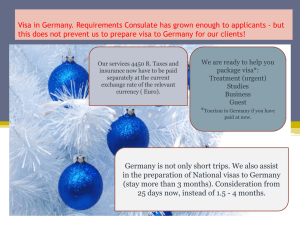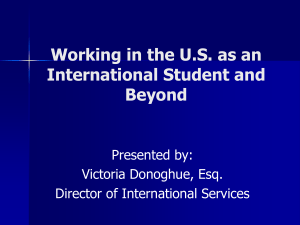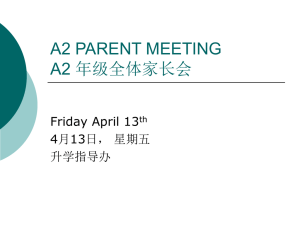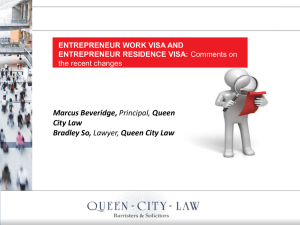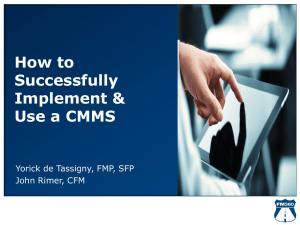bringing international faculty, employees and visitors to campus
advertisement
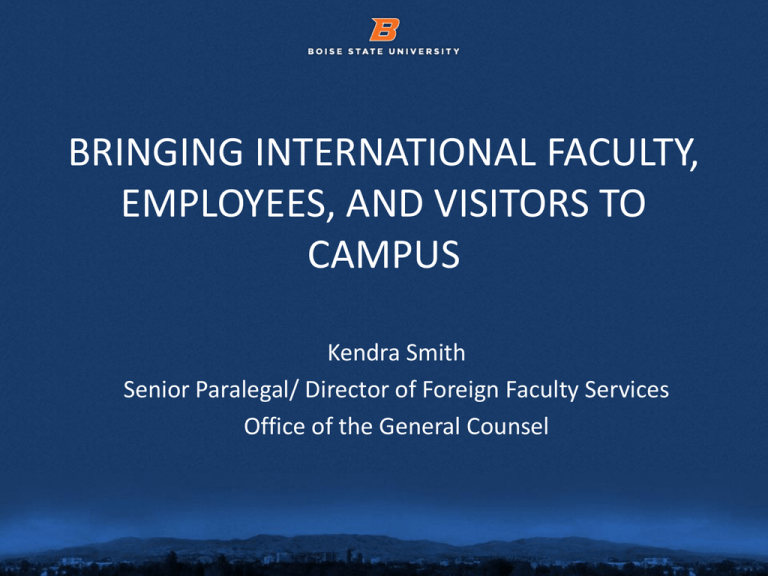
BRINGING INTERNATIONAL FACULTY, EMPLOYEES, AND VISITORS TO CAMPUS Kendra Smith Senior Paralegal/ Director of Foreign Faculty Services Office of the General Counsel © 2012 Boise State University 1 Overview Immigration law is extremely complicated. Most complications arise from pursuing a visa that is incompatible with the department’s or employee’s needs or that is inconsistent with the University’s procedures. To minimize visa issues, please contact Kendra Smith, in the Office of the General Counsel, as soon as you suspect that an employee or visitor may need a visa. Please note that in the case of an employee, it is best practice to notify Kendra Smith as soon as you are aware that a finalist for a position may require a visa. © 2013 Boise State University 2 Types of Visas TYPE USE DURATION COST TO UNIVERSITY H visa Faculty, Researchers, Postdocs, Professional Staff 6 years (in two 3-year increments) $320-$720 $1000 premium processing – if necessary, dept. or indiv. pays J visa Faculty (not tenure-track), Researchers, Post-docs, Visiting faculty/ researcher, visiting scholars (paid or unpaid) Up to 5 years None (although the visitor will pay fees at the consulate – approx. $320 F-1 OPT Student visa with Optional Practical Training Faculty, Researchers, Postdocs, Professional Staff 12 months 17 months extension - in some situations None TN Visa Faculty and Researchers 1 year None B-1/B-2 or WT/WB or VWP Rarely – for those on campus to give a speech 90 days or less None (visitor will pay fees at the consulate – approx. $140) *Contact Kendra Smith for specifics/details. © 2013 Boise State University 3 Types of Visas There are at least four types of visas used at the University. You will need to consult with me to ensure that your employee/visitor obtains the correct visa and has the correct paperwork. • H visa – used for most employees – available for up to 6 years (in 3year increments). • J visa – used for visiting faculty/researcher as well as for visiting scholars (unpaid by university) – available, in some situations, for up to 5 years • F-1 OPT – used, on occasion, for faculty or post-doctoral research positions – available for 12 months, with an 18-month extension available in some situations. • TN visa – available for certain categories of visitors from Canada and Mexico. • B-1/B-2 or WT/WB – these are visitor visas. In some, select, instances a B-1 or WB can be paid by the University. © 2013 Boise State University 4 Types of Employees • • • • • • Tenure-track and Research Faculty Visiting professor Instructor Post-doctoral researcher Adjunct faculty Professional staff The University requires that all visas related to such employment be handled through the office of The Office of the General Counsel. © 2013 Boise State University 5 Tenure-track and Research Faculty Types of Visas • Tenure-track and Research Faculty are generally employed at Boise State on an H visa. This is an employment visa that is good for two 3-year increments. There is usually no cost to the department (in some situations of extreme urgency, an extra payment of $1000 for “premium processing” must be paid by the department.) • Tenure-track and Research faculty may also start work on an F-1 visa with Optional Practical Training (OPT) authorization. • Some Tenure-track and Research faculty may be employed on TN visas. © 2013 Boise State University 6 Tenure-track and Research Faculty H visa Departmental Requirements • • Complete and submit the H1B Department Data Collection Form. Provide items requested: – – – – – • A completed Department Data Collection Form; A detailed position description which includes the job duties and responsibilities, minimum education and professional requirements and salary offered; A copy of any job advertisement placed; A copy of the offer letter; and A list of all department members with salary and years of experience. Changes in title or salary constitute a material change in employment so as to necessitate an amended filing with USCIS. Failure to do so could result in sanctions to the university or the individual. Sabbatical constitutes a change in salary and is generally not permitted while in H visa status. © 2013 Boise State University 7 Tenure-track an Research Faculty H visa Departmental Requirements Why is it necessary for the department to provide a list of all department members with salary and years of experience? The United States Department of Labor requires that all employees on an H visa be paid what they determine is the “prevailing wage.” Additionally, the employer is required to document the actual wage as well as the wages of similarly situated employees for the support documentation for the mandatory Labor Condition Application. The list of all department members with salary and years of experience is one small portion of the required back-up documentation. It is University procedure that the department gather this information. © 2013 Boise State University 8 Tenure-track and Research Faculty A Note on Hiring Procedures Please note that the Faculty Search Procedures, as found at http://hrs.boisestate.edu/managers/advertise-your-positionfaculty/, state the following: • 5. Permanent Residency: If you anticipate hiring an applicant who will need to apply for permanent residency at a future date, you will need to place an online ad in a national journal (e.g., Chronicle of Higher Education – Note: Must be a journal with articles not just job advertisements). Online ads and electronic journals are now sufficient. • 6. Visas: Contact Kendra Smith at 426-4407 as soon as you are aware that a finalist for a position may require a visa. For additional information on international hires (permanent residency and Visas) © 2013 Boise State University 9 Tenure-track and Research Faculty Hints for Interviewing • Ask every finalist if they are “authorized to work in the United States.” If they answer that they need a visa, it is best to have them visit my office when they do their oncampus interviews or to contact me as soon as you have hired them. • In order to ensure that your new hires receive assistance on a timely manner, please contact me as soon as possible to set up an appointment. Please do not have them drop in, as gaps in my schedule are not sufficient to resolve issues or gather necessary information. © 2013 Boise State University 10 Tenure-track and Research Faculty F1 OPT Visa The F1 visa is a student visa. Upon graduation, the student is eligible to work in their field for 12 months in a category called Optional Practical Training. In some areas, this can be extended to 17 months. This visa is obtained by the student. Although the University is not required to file documents to obtain this status for the employee, the Office of the General Counsel must still be contacted when hiring someone in this category. © 2013 Boise State University 11 Tenure-track and Research Faculty F1 OPT Visa The TN visa was developed as part of NAFTA to facilitate the entry of Canadian and Mexican citizens who are working for a U.S. employer in certain occupations. © 2013 Boise State University 12 Postdoctoral Researcher The position of Postdoctoral Researcher will be employed either on an H visa, a J visa or occasionally on F1 OPT. At times, it can be difficult to obtain an H visa for this position as the H visa has a regulation regarding levels of pay, which some post-doctoral positions may not meet. © 2013 Boise State University 13 Postdoctoral Researcher J Visa The J visa is an exchange visitor visa, good for up to 5 years. This is a complex visa with some restrictions. The three restrictions (which don’t apply to all Js) are the: • 2-year return - in some cases the visitor must return home for 2 years prior to receiving another J professor/researcher visa. • 12-month bar - visitor is not eligible to begin a program as a Professor or Research Scholar if he/she was physically present in any J status for all or part of the twelve month period immediately preceding the date of commencement. • 24-month bar - A Professor or Research Scholar who has previously either completed 5 years on a J or “completed their program” is ineligible for “repeat participation” in those categories until 24 months have passed. © 2013 Boise State University 14 Postdoctoral Researcher J Visa (continued) • The J visa is much easier to process than the H visa and it is at no cost to the University. • If your employee is on a J visa, please be cognizant of the visa end date and alert me as soon as possible to any possible extensions of employment. • J visa holders are not permitted to be employed in tenure-track positions. • This visa type requires that the department assist in orientation to life in the United States, including transportation, medical facilities, shopping, etc. and include the visitor in cultural events (a complete list of requirements will be emailed to inquiring departments.) • Tenure-track faculty may not be on a J visa. © 2013 Boise State University 15 Adjunct Faculty Boise State does not sponsor part-time H visas, therefore adjunct faculty may not be hired on an H visa. However, it is sometimes possible to hire an international scholar into an adjunct faculty position. Please contact Kendra Smith to discuss this possibility. © 2013 Boise State University 16 Professional Staff Some professional staff positions may be filled using an H visa. The position must require an advanced degree in a particular subject. © 2013 Boise State University 17 Exchange Visitors to Boise State Examples • A professor on sabbatical from his home university who is funded either by his home university or is self-funded wishes to come to Boise State to conduct research for one year. The department will provide office space. • A student wishes to come to Boise State to conduct research and wishes to work with a certain professor or on some particular equipment . This student is entirely self-funded or is funded by their home institution. • A professor comes to teach/co-teach two summer classes. • A director comes to Boise State to put on a theatrical production and will be here for three weeks. © 2013 Boise State University 18 Exchange Visitors to Boise State Examples (continued) In the previous examples, most of these visitors will come on a J visa. The department has certain duties required of it when bringing a J Exchange visitor to Boise State. The department will be required to: •Provide office space; •Assist in finding housing and setting up a household; •Assist in obtaining a SSN if necessary; •Assist in orientation to life in the United States, including transportation, medical facilities, shopping, etc.; and •Include the visitor in cultural events. © 2013 Boise State University 19 Visitors to Boise State In all instances, a visitor coming to Boise State must have a certain type of visa. It is best to check with the Office of the General Counselto determine the appropriate visa type. B visa or Visa Waiver program – these categories should only be used for very short-term visitors (e.g. someone coming to interview for a job or to co-teach a very short seminar). Misuse of these visa categories could have long-lasting implications for both the University and the visitor. Additionally, payments to visitors in these categories can be problematic. © 2013 Boise State University 20 Permanent Residency If you hire someone on an H visa, you should consult the Permanent Residency Procedure, located at: http://operations.boisestate.edu/generalcounsel/resid ency/ Please note: Not all employees are eligible for Boise State’s Permanent Residency Procedure. Please consult the webpage listed above. © 2013 Boise State University 21 Permanent Residency (continued) The Labor Certification portion of the Permanent Residency Application must be filed within 180 days from the “date of selection” which usually means the date on the top of the offer letter. Due to this time restriction, it is recommended that one proceed with the Permanent Residency Process as soon as possible following the first semester at Boise State University. If the 180-day window is missed or if a print ad was not placed, one can still pursue Permanent Residency however, readvertising the position may be required. The immigration attorney selected will be able to advise on this matter. © 2013 Boise State University 22 Conclusion The University procedure requires that all non-U.S. citizen/ permanent resident employees and visitors to the University possess the proper visa. In most cases, the University will assist the employee/visitor in obtaining this visa. Failure to ensure that an employee/visitor to your department has obtained the correct visa could endanger the University’s ability to obtain future visas and/or endanger the employee/visitor’s ability to enter the U.S. For all matters or questions regarding international employees and visitors, please contact Kendra Smith in the Office of the General Counsel. © 2013 Boise State University 23 Kendra Smith Senior Paralegal/ Director of Foreign Faculty Services Office of the General Counsel Email: ksmith2@boisestate.edu Phone: (208)426-1203 THANK YOU © 2013 Boise State University 24
